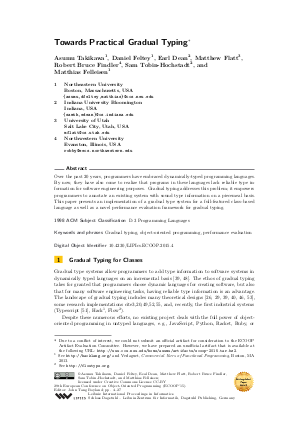Towards Practical Gradual Typing
Authors Asumu Takikawa, Daniel Feltey, Earl Dean, Matthew Flatt, Robert Bruce Findler, Sam Tobin-Hochstadt, Matthias Felleisen
-
Part of:
Volume:
29th European Conference on Object-Oriented Programming (ECOOP 2015)
Part of: Series: Leibniz International Proceedings in Informatics (LIPIcs)
Part of: Conference: European Conference on Object-Oriented Programming (ECOOP) - License:
 Creative Commons Attribution 3.0 Unported license
Creative Commons Attribution 3.0 Unported license
- Publication Date: 2015-06-29
File

PDF
LIPIcs.ECOOP.2015.4.pdf
- Filesize: 0.84 MB
- 24 pages
Document Identifiers
Subject Classification
Keywords
- Gradual typing
- object-oriented programming
- performance evaluation
Metrics
- Access Statistics
-
Total Accesses (updated on a weekly basis)
0PDF Downloads0Metadata Views
Abstract
Over the past 20 years, programmers have embraced dynamically-typed programming languages. By now, they have also come to realize that programs in these languages lack reliable type information for software engineering purposes. Gradual typing addresses this problem; it empowers programmers to annotate an existing system with sound type information on a piecemeal basis. This paper presents an implementation of a gradual type system for a full-featured class-based language as well as a novel performance evaluation framework for gradual typing.
Cite As Get BibTex
Asumu Takikawa, Daniel Feltey, Earl Dean, Matthew Flatt, Robert Bruce Findler, Sam Tobin-Hochstadt, and Matthias Felleisen. Towards Practical Gradual Typing. In 29th European Conference on Object-Oriented Programming (ECOOP 2015). Leibniz International Proceedings in Informatics (LIPIcs), Volume 37, pp. 4-27, Schloss Dagstuhl – Leibniz-Zentrum für Informatik (2015)
https://doi.org/10.4230/LIPIcs.ECOOP.2015.4
BibTex
@InProceedings{takikawa_et_al:LIPIcs.ECOOP.2015.4,
author = {Takikawa, Asumu and Feltey, Daniel and Dean, Earl and Flatt, Matthew and Findler, Robert Bruce and Tobin-Hochstadt, Sam and Felleisen, Matthias},
title = {{Towards Practical Gradual Typing}},
booktitle = {29th European Conference on Object-Oriented Programming (ECOOP 2015)},
pages = {4--27},
series = {Leibniz International Proceedings in Informatics (LIPIcs)},
ISBN = {978-3-939897-86-6},
ISSN = {1868-8969},
year = {2015},
volume = {37},
editor = {Boyland, John Tang},
publisher = {Schloss Dagstuhl -- Leibniz-Zentrum f{\"u}r Informatik},
address = {Dagstuhl, Germany},
URL = {https://drops.dagstuhl.de/entities/document/10.4230/LIPIcs.ECOOP.2015.4},
URN = {urn:nbn:de:0030-drops-52156},
doi = {10.4230/LIPIcs.ECOOP.2015.4},
annote = {Keywords: Gradual typing, object-oriented programming, performance evaluation}
}
